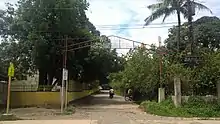| Purok | |
|---|---|
 Welcome arch of a purok | |
| Category | Zone |
| Location | Philippines |
| Found in | Barangay |
 |
|---|
|
|
A purok (English: district[1] or zone) is an informal division within a barangay in the Philippines.[2][3] While not officially considered a local government unit (LGU), a purok often serves as a unit for delivering services and administration within a barangay.[4]
A purok is typically composed of twenty to fifty or more households, depending on the particular geographical location and cluster of houses.[4] The term purok is often applied to a neighborhood (zone) within an urbanized barangay, or a portion (district) of a less densely populated, but still relatively geographically compact, barangay. This contrasts with the sitio, which is usually a cluster of households (hamlet) in a more dispersed, rural barangay.
If created and given a mandate by an ordinance of the barangay, municipality, or city, a purok could perform government functions under the coordination and supervision of their local officials.[4] Sometimes, a member of the Sangguniang Barangay (Barangay Council) may be recognized as the leader of their purok.[5]
New barangays are often created by officially enumerating which puroks and/or sitios are included within the territory.[6][7] On rare occasions, a purok may also be enumerated in the creation of a municipality, as in the case of Shariff Saydona Mustapha, Maguindanao where the puroks of Libutan East and Pagatin I were directly named as one of the constituent parts of the new municipality.[8] These two puroks were later recognized as full-fledged barangays by the Philippine Statistics Authority in early 2010.[9]
See also
References
- ↑ Santos, Arceli (2006). Vicassan's Pilipino-English Dictionary (Abridged ed.). Pasig, Philippines: Anvil Publishing Inc. p. 524. ISBN 971-27-1707-0.
- ↑ "Philippine Standard Geographic Code (PSGC) – Concepts and Definitions – Local Government Units". Philippine Statistics Authority. Archived from the original on January 14, 2017. Retrieved August 13, 2019.
- ↑ Guillermo, Artemio R.; Win, May Kyi (2005). Historical Dictionary of the Philippines (2nd ed.). Lanham, Maryland, United States of America: Scarecrow Press, Inc. p. 328. ISBN 978-0-8108-5490-1.
- 1 2 3 "Purok system mobilizes community, improves governance". Ramon Aboitiz Foundation Inc. May 7, 2012. Archived from the original on December 8, 2013. Retrieved August 13, 2019.
- ↑ Alkuino, Xerxes (August 7, 2012). "LGUs urged to put up purok system". Provincial Government of Cebu. Archived from the original on July 22, 2014. Retrieved August 13, 2019.
- ↑ Congress of the Philippines (October 30, 2017). "Republic Act No. 10955 – An Act Dividing Barangay Dumalneg in the Province of Ilocos Norte into Three (3) Distinct and Independent Barangays to be Known as Barangay Kalaw, Barangay Cabaritan and Barangay Quibel" (PDF). The Official Gazette of the Republic of the Philippines. Retrieved August 13, 2019.
- ↑ Congress of the Philippines (February 7, 2018). "Republic Act No. 10971 – An Act Creating a Barangay to be Known as Barangay Poblacion 3 in the Municipality of Villanueva, Province of Misamis Oriental" (PDF). The Official Gazette of the Republic of the Philippines. Retrieved August 13, 2019.
- ↑ "Muslim Mindanao Autonomy Act No. 252 – An Act Amending Muslim Mindanao Autonomy Act Numbered Two Hundred Twenty Five, Particularly sections One and Two thereof, and for other purposes" (PDF). Regional Legislative Assembly, Autonomous Region in Muslim Mindanao. October 27, 2008. Retrieved August 13, 2019.
- ↑ "SUMMARY OF CHANGES MADE IN THE PHILIPPINE STANDARD GEOGRAPHIC CODE". Philippine Statistics Authority. June 30, 2019. Retrieved August 13, 2019.